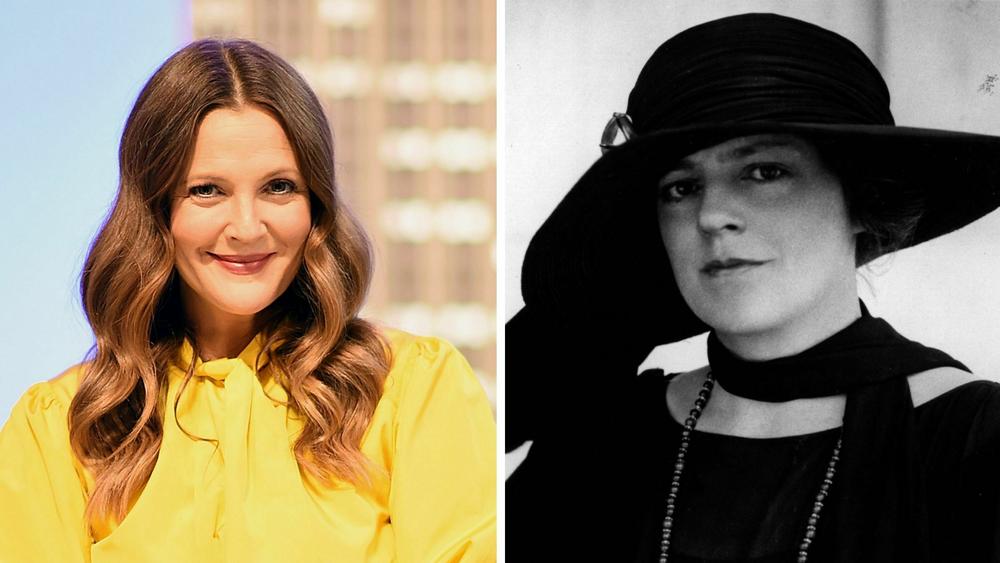Section Branding
Header Content
Drew Barrymore's Hollywood labor scuffle isn't the first for her family
Primary Content
Daytime talk shows became daytime dramas this week: First Drew Barrymore, Jennifer Hudson, Bill Maher and other hosts announced they would be back on the air without their writers who are currently on strike against major studios. But now, after intense backlash, all of them have called off their season premieres.
Barrymore in particular, became the center of the storm. When the writers strike first started in May, she publicly said she was in support, and even turned down hosting the MTV awards. Then last week, she announced her show would resume. There were protests on social media, even some by her own writers. The National Book Awards rescinded its invitation for her to host its annual ceremony.
On Friday, Barrymore seemed to double down on the decision to resume. She posted a tearful video message on Instagram, saying "I deeply apologize to writers, I deeply apologize to unions, I apologize." Barrymore said she was taking full responsibility for the decision to resume. "We aren't gonna break rules and we are gonna be in compliance. I wanted to do this because, as I said, this is bigger than me and there are other people's jobs on the line," she said.
But that video inspired so much vitriol — people online called her a scab — that Barrymore quickly deleted it. Over the weekend, she posted again saying she had listened to everyone and is no longer airing her next season until the strike ends.
Barrymore's reverse-course kicked off a domino effect; within hours, Jennifer Hudson announced she would no longer resume her show. CBS's The Talk announced the same. And Monday morning, Bill Maher did, too.
"My decision to return to work was made when it seemed nothing was happening and there was no end in sight to this strike," Maher posted on Instagram. "Now that both sides have agreed to go back to the negotiating table I'm going to delay the return of Real Time, for now, and hope they can finally get this done."
Meanwhile, throughout the strike, The View has continued its show without writers. Host Sherri Shepherd says she never employed WGA writers, so she resumed her talk show this week. Other shows on the air: Live With Kelly And Mark, Tamron Hall.
Echoes of the past
Drew Barrymore was the most public about her decisions, and probably the most talked-about. She's been famous her entire life, as a member of Hollywood acting royalty. People still remember her as the little girl who was friends with E.T. in the 1982 movie.
During the Barrymore brouhaha, journalist Michael Schulman says he was reminded of something he learned while writing his book Oscar Wars. Drew's great aunt Ethel Barrymore had been a theater actor and was very involved with the union Actors' Equity, which represented stage actors. She went on strike against Broadway producers in 1919.
But 10 years later, Schulman says, when the head of Actors' Equity tried to organize Hollywood actors, Ethel Barrymore singlehandedly undermined that effort. Barrymore, who by that time had become the vice president of Equity, "suddenly released a statement saying ... that it was her understanding that Equity and the studios had come to a settlement and it was over."
Schulman says her statement broke the solidarity between the stage actors and movie actors, and the unionization attempt failed.
Schulman says the president of Equity, Frank Gilmore, was caught off guard, and in a statement, called Barrymore's move "regrettable." Union members were reportedly furious, too.
"One of the actors said 'If Miss Barrymore could not say anything beneficial for us, the least she could have done would have been to keep still,'" Schulman says.
"It also came out that Ethel Barrymore had met with the producers Irving Thalberg and Jack Warner in a dressing room, and that she had taken a role in a Warner Brothers film. So there was just all this outcry that Ethel had basically parachuted in and derailed this whole effort."
Schulman explains that while the effort to unionize movie actors in Equity failed, later that year, 45 of them banded together to create the Screen Actors Guild. That union later merged with AFTRA, and SAG-AFTRA is the union that Drew Barrymore is a member of today and that is on strike.
The lesson of both Barrymore sagas, says Schulman, is "if you don't have solidarity and present a united front, things can really get derailed fast."
Copyright 2023 NPR. To see more, visit https://www.npr.org.

